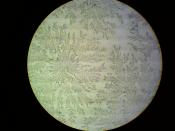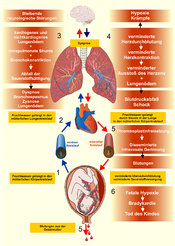Amniocentesis is a procedure used to collect a small amount of amniotic fluid from around the baby. The fluid is then analyzed to determine the existence of certain disorders. Standard genetic amniocentesis is usually performed between 15 and 18 weeks of pregnancy, counting from the first day of the last menstrual period. Amniocentesis is performed in conjunction with an ultrasound scan. Ultrasound, which uses sound waves to safely produce an image of the unborn child for analysis, is important in determining the size and position of the baby, and for locating pockets of amniotic fluid surrounding the baby. It is also used to monitor the baby's development. Once the position of the baby, amniotic fluid, and placenta are determined a needle is inserted into the woman's abdomen and into her uterus. Approximately one to two tablespoons of fluid are withdrawn through the needle and sent to the laboratory for analysis.
Most women find that this procedure is not painful and describe it more as a feeling of pressure.
Genetic counselors are health professionals with specialized graduate degrees and experience in the areas of medical genetics and counseling. Most enter the field from a variety of disciplines, including biology, genetics, nursing, psychology, public health and social work. Genetic counselors work as members of a health care team, providing information and support to families who have members with birth defects or genetic disorders and to families who may be at risk for a variety of inherited conditions. They identify families at risk, investigate the problem present in the family, interpret information about the disorder, analyze inheritance patterns and risks of recurrence and review available options with the family.Genetic counselors also provide supportive counseling to families, serve as patient advocates and refer individuals and families to community or state support services.


